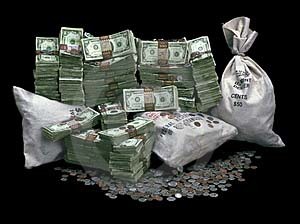After issuing stock shares, companies are increasingly saving the proceeds as cash instead of spending the money to build new facilities or hire additional employees. Research by MIT Sloan School of Management Visiting Professor David McLean suggests this holding onto cash reflects increasing precautionary motives.
“It’s always hard to predict how costly it will be to issue equity,” he says. “Recessions and financial crises can make it very costly if not impossible to raise capital, so it is sensible for companies that may need outside financing in the future to issue shares when times are good and save the proceeds for when times are bad.”
In his study, McLean examined share-issuance cash savings over a 38-year period in a large sample of U.S. firms. He found that during the 1970s $1.00 of issuance resulted in $0.23 of cash savings. That is considerably less than in recent years, when $1.00 of issuance resulted in $0.60 of cash savings.
‘Greater Precautionary Needs’
“My study suggests that firms are saving more of their share issuance proceeds as cash because they have greater needs for precautionary cash savings than before,” he says. “Financial economists have linked cash savings to R&D spending and cash flow volatility. Firms try to avoid cutting R&D spending in recessions, so high R&D firms tend to hold a good deal of cash.”
McLean notes firms with higher cash flow volatility are more likely to face financing shortfalls, so these firms also tend to hold a lot of cash. Both R&D spending and cash flow volatility increased during the last four decades, and it’s the firms with high levels of these two attributes that saved the most cash from share issuance, according to his research.
As for why these firms don’t instead save from their profits, McLean explains they tend to have weak internal cash flows. Debt is typically not suitable for firms with weak and volatile cash flow, so share issuance is their only viable cash source.
Looking at business cycles over the last four decades, his study shows firms not only issue more shares in expansions but also save a greater portion of the proceeds as cash.
‘Good Economic Reasons’ for Saving
“Empirically, the effect of issuing shares and then saving the proceeds as cash is greatest when the economy is expanding,” he says. “I think this is because in a weak economy, investors tend to have less of an appetite for risky investments so it is costlier for firms to sell shares. Firms realize this and therefore issue and save when times are good so they can avoid issuing when times are bad.”
In a follow-up study, McLean looked at a sample of firms from 44 different countries during the period 1988-2010. He found in countries with developed economies and financial sectors, share issuance cash savings are similar to what is found in the United States: The savings rates are of similar magnitude, the savings are greatest in expansions, and the savings are greatest for firms with high R&D spending and high cash flow volatility.
He notes he initially suspected firms were issuing shares and saving the proceeds because of mispricing or market timing – entering, staying in or getting out of stock markets based on whether companies expect stock markets to move up or down in the foreseeable future. However, his research suggests there are in fact “good economic reasons” for these firms to issue shares and save cash.
“Precautionary cash savings have become increasingly important, as product market competition, cash flow volatility, and R&D spending have all increased during the last four decades,” he says.
Paul Denning ([email protected]) is director of media relations for the MIT Sloan School of Management in Cambridge, Massachusetts.
Internet Info
“Share issuance and Cash Savings,” R. David McLean: http://heartland.org/policy-documents/share-issuance-and-cash-savings




